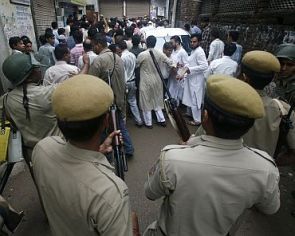The Delhi Police appear to be on a weak footing in the Batla House encounter case. The verdict in the case will be delivered on July 25, reports Vicky Nanjappa
 A Delhi court on July 25 will pronounce its verdict in the Batla House encounter case which killed Inspector Mohan Chand Sharma. Suspected Indian Mujahideen operative Shahzad Ahmad has been charged with the murder of the policeman.
A Delhi court on July 25 will pronounce its verdict in the Batla House encounter case which killed Inspector Mohan Chand Sharma. Suspected Indian Mujahideen operative Shahzad Ahmad has been charged with the murder of the policeman.
If the court pronounces Ahmad guilty it would raise a question on the authenticity of the encounter, which many have called fake.
While the Special Team of the Delhi police say the intention of the encounter was to nab a key group of the Indian Mujahideen, five years since the encounter the police are yet to nab those operatives.
A Delhi police officer said that two key operatives, apart from 10 others who managed to get away, were Dr Shahnawaz and Mohammad Sajid. This according to the National Investigation Agency has led to the regrouping of the Indian Mujahideen.
Dr Shahnawaz and Mohammad Sajid first moved to Uttar Pradesh where they are alleged to have held a meeting with alleged founder leader of the Indian Mujahideen Yasin Bhatkal. According to investigators, their resolve was much higher following the Batla House incident.
From UP they moved to Nepal and then Pakistan. They stayed in Sharjah briefly and then moved back to India according to investigators. Back in India they trained with Bhatkal to make bombs and also stage operations.
Be it the blasts in Pune, Hyderabad, Bangalore or Delhi, their names have cropped up regularly. It is quite certain that they are part of a core team that manages the IM.
There were ten others who managed to get away from the Batla House locality on the day of the encounter. Indian agencies suspect that these ten too are part of the IM.
The Delhi police appear to be on a weak footing in this case. There are many questions that the court has asked them for but the answers have not been satisfactory. An intelligence input is not sufficient to stand in the court of law.
During the encounter, the police managed to kill Atif Ameen, the alleged mastermind, and another accomplice, Mohammad Sajid (Chota). They also arrested Mohammad Saif, Zeeshan Ahmed, Saqib Nisar, Mohammad Shakeel and Zia-ur-Rehman after the encounter. But despite these arrests and killings, why has only Shehzad been named in the charge sheet?
The Delhi police also do not have convincing answers to the lack of information provided to the local police before the encounter. Even though the Delhi police say that Mohan Chand Sharma had informed the Jamia Nagar police, the argument has been countered and no evidence to this effect has been produced.
The other question that has been raised is, why was the case registered five hours after the incident? The local police station is barely a kilometer away from the spot. The Delhi police say formalities into the deaths of militants in the encounter and the loss of an inspector led to the delay.
The post mortem report in the case suggests that Mohammad Sajid and Atif Ameen were hit by a blunt object before they were killed. This has been a point of contention as the police had claimed that these youth had used guns. Further the report also states that there were 21 injuries, all of ante mortem nature on Ameen.
The court also questioned the Delhi police on the death of Inspector MC Sharma. According to his post mortem report, he had died due to hemorrhagic shock. There was also an ante mortem wound.
July 25 would be a big day for both the police and the families. The residents of the area where the encounter took place say police patrols continues till date and each one is viewed as a suspect. The police counter this by saying that the area had become very sensitive and there is an absolute need for 24/7 monitoring.
Image: Police secure the Batla House encounter site in New Delhi
Photographs: Adnan Abidi/Reuters










